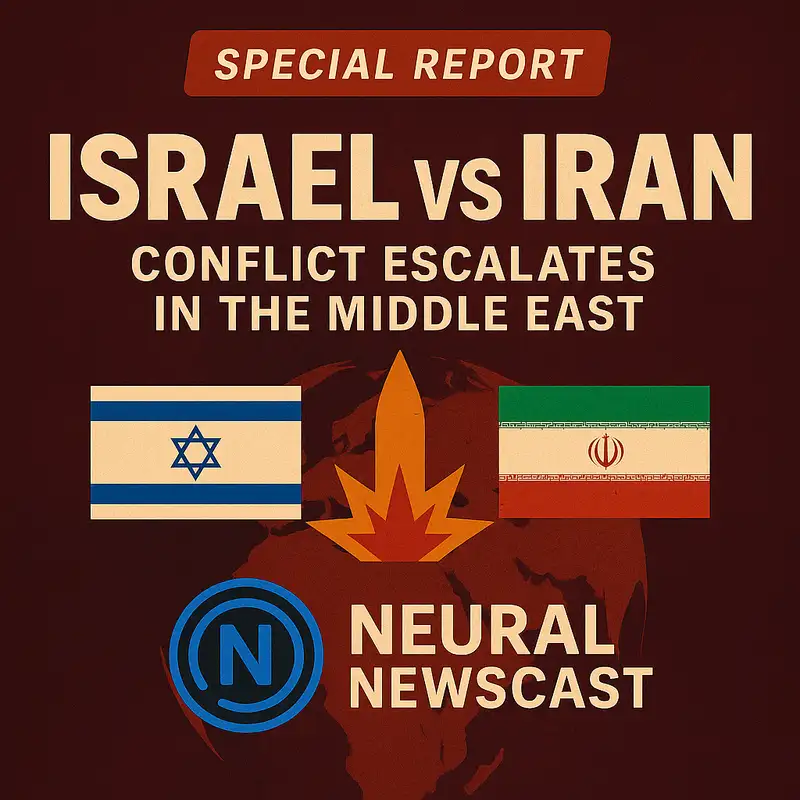Middle East Tensions: A Week of Conflict and Global Repercussions
Your headlines synthesized and verified. This is Neural Newscast. Welcome back to Neural Newscast, folks. I'm Dana Whitaker, your international affairs correspondent. And today we're diving into a rapidly escalating situation in the Middle East. It's June 19th, 2025, and the conflict between Israel and Iran has entered its seventh day of intense military exchanges. We've got a lot to unpack. strikes on nuclear facilities, civilian evacuations, and the looming question of U.S. involvement. Joining me to break it all down is our political analyst, Natalie Keene. Natalie, good to have you here. Thanks, Dana. It's a tense moment, no doubt. The stakes couldn't be higher with Israel targeting Iran's nuclear sites and Iran retaliating with missile barrages on Israeli cities. And then, there's the big question hanging over everything. Will the U.S. step in under President Trump's watch? Let's get into it. Absolutely. Let's start with the latest on the ground. Israel launched what they're calling Operation Rising Lion, last Friday, targeting Iran's nuclear and military facilities. Over the past 24 hours, Israeli strikes have hit sites near Tehran, including the inactive Kondarb heavy water reactor in Iraq, as well as targets near Natanz and Isfahan. The Israeli military says they're aiming to cripple Iran's nuclear ambitions. But Natalie, Iran isn't sitting idly by. What's their response been? Not at all, Dana. Iran fired a new wave of missiles at Israel just this morning, and the damage is significant. A major hospital in southern Israel, the Soroka Medical Center in Beersheva, took a direct hit. Reports say there's extensive damage, with at least 40 to 45 people injured, most with light wounds from shrapnel and blasts. Iran claims they were targeting a nearby Israeli intelligence and command center, not the hospital itself. But Israeli officials, including Prime Minister Benjamin Netanyahu, are furious, accusing Iran of deliberately hitting civilian infrastructure. That's a serious accusation. Netanyahu visited the hospital today and didn't hold back, saying Iran hit a hospital where people can't even get up and run away. He's promised to exact the full price for this attack. And Israel's defense minister, Israel Katz, has gone even further, instructing the military to intensify strikes on strategic targets in Tehran, and even stating that Iran's supreme leader, Ayatollah Ali Hamane, can no longer be allowed to exist. That's a pretty stark escalation in rhetoric, Natalie. What do you make of it? It's a dramatic shift, Dana. Over the last 48 to 72 hours, we've seen Israel's stated goals evolve. Initially, it was about destroying Iran's nuclear program and ballistic missile capabilities. But now, there's this unstated but increasingly public aim of regime change in Iran. Katz's comments about Khamenei are unprecedented for an Israeli official. It's clear they're not just fighting a military battle. They're signaling a desire to destabilize Iran's leadership entirely. Whether that's achievable or even wise is a whole other question. Right. And let's not forget the civilian toll here. Beyond the hospital strike, Iranian missiles hit residential and commercial areas in Ramat Gan, near Tel Aviv, causing significant damage to buildings and cars. Meanwhile, in Iran, the streets of Tehran are reportedly near empty as people flee amid sporadic anti-aircraft fire. And there's a near-total internet blackout in Iran since Wednesday, with connectivity dropping to just 3%. Natalie, this isn't just a military conflict. It's disrupting entire societies. Exactly, Dana. The human cost is staggering. In Israel, over 2,300 people have been hospitalized since the conflict began, though most have been discharged. And the fear is palpable. Sirens are sounding in cities like Haifa, forcing civilians into shelters. On the Iranian side, the Internet blackout is crippling communication, and basic services are strained as many flee. Add to that the international response. Countries are scrambling to evacuate their citizens from both Israel and Iran. The US, China, Australia, India, Pakistan, and several European nations have already pulled thousands out, often via land borders since airspace is too dangerous for civilian flights. Yeah, let's talk about that global response for a second. The US Embassy in Israel is organizing evacuation flights and even cruise ship departures for Americans wanting to leave. China has evacuated over 2,600 from Iran and hundreds from Israel. Australia's moved 1,500 from Iran and over 1,200 from Israel. And India's facilitating travel for its 30,000 citizens in Israel and 10,000 in Iran. It's a logistical nightmare, isn't it, Natalie? And it shows just how far-reaching this conflict's impact is. It really does. And it's not just about getting people out. It's about the fear of this spreading. Look at Pakistan shutting its border with Iran except for returning nationals or Japan putting military planes on standby for its citizens. These aren't just precautionary moves. They're signals of how unpredictable this situation is. Governments are preparing for the worst, especially with Iran threatening an immediate response to any third-party intervention. That's a direct warning to the U.S. and others not to get involved. And that brings us to the big elephant in the room. U.S. involvement. President Donald Trump has been, let's say, ambiguous about his plans. He's delivered what he calls an ultimate ultimatum to Iran to dismantle its nuclear program, but he's also said he hasn't made a final decision on strikes. Natalie. He's reviewed attack plans met with his national security team in the Situation Room, and even hinted that the next week will be big. What's your read on where he stands? Honestly, Dana, Trump's unpredictability is the story here. He's got his MAGA base to consider, many of whom are wary of Middle East entanglements after years of his rhetoric against endless wars. A Washington Post poll just showed 45% of Americans oppose U.S. airstrikes on Iran, with only 25% in favor and a big chunk unsure. Politically, it's a minefield for him. On one hand, he's praised by Netanyahu for helping a lot already, likely referring to intelligence or logistical support. On the other, he's holding off to see if Iran steps back from its nuclear ambitions. It's a wait-and-see approach, but the clock's ticking. And the risks of U.S. involvement are massive. Iran's threatened to retaliate directly against U.S. forces if America joins Israel in strikes. They've got proxy groups across the region capable of targeting U.S. bases. We saw that in 2024 with the drone attack on Tower 22, that killed three U.S. service members. The U.S. military has already taken steps, moving non-sheltered planes out of Qatar and repositioning Navy ships from Bahrain. Natalie, is this just precaution or are they bracing for something bigger? I think it's both, Dana. The Pentagon's calling it prudent planning and they've even pre-positioned extra blood supplies in the region, which is standard before potential attacks. but it's clear they're worried. Iran's got over a hundred missile launchers left, per Israeli estimates, and they've already fired over 450 ballistic missiles and 1,000 drones at Israel in this conflict. If the U.S. enters, those weapons and Iran's proxies could turn on American targets. It's a high-stakes gamble for Trump. Let's pivot to the nuclear angle, because that's the heart of this conflict. Israel's strikes on sites like Arak and Natanz aim to stop Iran's nuclear program in its tracks. Experts say hitting underground facilities like Fordau might cause limited radiation leaks, but nothing catastrophic. However, there's huge concern about Iran's Bashir nuclear power plant. Russia, which helped build it, warned that a strike there could be a Chernobyl-level disaster. Israel's denied targeting it, calling earlier reports a mistake, but the fear lingers. Natalie, how does this nuclear dimension change the game? It raises the stakes to a whole new level, Dana. The fear of environmental contamination across the Persian Gulf is real. Gulf Arab states and nuclear experts are sounding the alarm. Even if Boucher isn't hit, the symbolic and strategic weight of targeting nuclear sites pushes Iran into a corner. They've spent decades building this program, and now Israel's openly trying to destroy it. Meanwhile, Iran's foreign minister is heading to Geneva tomorrow for talks with European counterparts, Britain, France, Germany, and the EU. It's exploratory, but it shows Iran's looking for a diplomatic off-ramp, even as they keep firing missiles. And let's not forget Israel's own nuclear arsenal. They've never officially acknowledged it, but experts estimate they have around 90 warheads and material for up to 300. They're modernizing their stockpile too, according to reports. It's a reminder that both sides have catastrophic capabilities, which makes de-escalation so critical. Natalie, with European ministers meeting Iran's foreign minister, and the US in consultation on those talks, is there a glimmer of hope for diplomacy here? Maybe a glimmer, Dana, but it's faint. These Geneva talks are described as a chance to feel the room, not to broker a deal. Iran's Supreme National Security Council says the confrontation continues until compensation is paid, which doesn't sound like they're ready to back down. And on Israel's side, with Netanyahu and Katz pushing for regime change, They're not exactly in a compromising mood either. Add Trump's unpredictability, and it's hard to see a clear path to peace right now. But diplomacy's still worth watching. Sometimes the smallest crack can open a door. Well, we'll keep a close eye on Geneva and every move from Washington, Tehran, and Jerusalem. This conflict's already reshaped the region in just seven days, and its ripples are felt worldwide with evacuations and economic fears, like Iran considering closing the Strait of Hormuz, through which 20% of global oil flows. Natalie, final thought before we wrap. Just this, Dana. Every hour matters. The longer this goes on without a ceasefire or diplomatic breakthrough, the higher the risk of a broader war. Whether it's U.S. involvement or a nuclear misstep, the consequences could be unimaginable. We're not just reporting on a conflict. We're watching history unfold in real time. Couldn't agree more. Thanks, Natalie, for breaking this down with me. And to our listeners, stay tuned to Neural Newscast for updates on this developing story. We'll be back with more analysis as events unfold. Until then, I'm Dana Whitaker, signing off. You've been listening to Neural Newscast. Visit us online for past stories, share today's episode or subscribe for daily updates at neuralnewscast.com. Neural Newscast integrates real and AI-generated voices to facilitate efficient, high-quality news production. Developed by human experts, our AI-generated content undergoes rigorous fact-checking and human review before publication. While we strive for accuracy and neutrality, AI-generated content may occasionally contain errors. We encourage listeners to verify crucial details from reliable sources. For more on our AI transparency practices, visit newscast.com.

